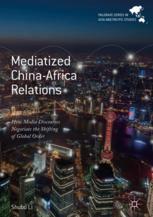

Most ebook files are in PDF format, so you can easily read them using various software such as Foxit Reader or directly on the Google Chrome browser.
Some ebook files are released by publishers in other formats such as .awz, .mobi, .epub, .fb2, etc. You may need to install specific software to read these formats on mobile/PC, such as Calibre.
Please read the tutorial at this link: https://ebookbell.com/faq
We offer FREE conversion to the popular formats you request; however, this may take some time. Therefore, right after payment, please email us, and we will try to provide the service as quickly as possible.
For some exceptional file formats or broken links (if any), please refrain from opening any disputes. Instead, email us first, and we will try to assist within a maximum of 6 hours.
EbookBell Team

0.0
0 reviewsThis cutting edge book explores the role of the media in the highly disputed area of China-Africa relations, notably how various aspects of the issue have been portrayed, negotiated and contested in media and academic discourses. As Africa’s biggest trading partner and creditor, China explores Africa not only as a marketplace for importing primary commodities and exporting manufactured goods, but also as a preferred testing ground for its media and telecommunication sector aspiring for further internationalization. At a time when the influence from Global North has been on the wane in the continent, emerging powers are regarded as new inspirations for Africa’s development. China in particular tries to bolster multipolarity in Africa by factoring in media influence and facilitating the digitalization process of the continent. This book offers an up-to-date geopolitical analysis of China-Africa, examining the role of communication and telecommunication in the power shift, especially in constructing social and cultural realities in which the idea of “development” has been recurrently redefined and negotiated in the public domain. This volume tackles the issue from the new perspective of mediatization, considering how the media on the one hand shapes public opinion with its narratives and a logic of its own, and on the other hand simultaneously becomes an integrated part of other institutions like politics, trade, business as more of these institutional activities are performed through both interactive and mass media.